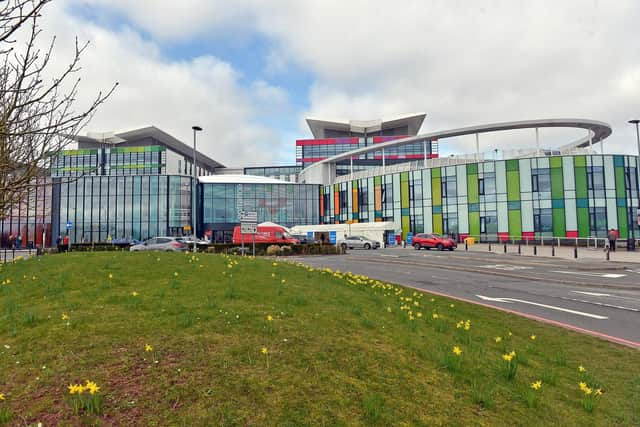Rise in visits to A&E at Sherwood Forest Hospitals Trust
and live on Freeview channel 276
The Nuffield Trust said there would not be any let up for the NHS in dealing with the backlog caused by the coronavirus pandemic and the ‘broken and overstretched care system’ continues to hinder staff's best efforts.
NHS England figures show 43,008 patients were waiting for non-urgent elective operations or treatment at Sherwood Forest Hospitals NHS Trust – which runs Sutton’s King’s Mill, Mansfield Community and Newark hospitals – at the end of June, up from 42,571 in May, and 37,433 in June 2021.
Advertisement
Hide AdAdvertisement
Hide AdOf those, 632, 1 per cent, had been waiting for longer than a year.


The median waiting time from referral to treatment at SFH was 10 weeks at the end of June – the same as in May.
Nationally, 6.7 million people were waiting to start treatment at the end of June.
Jessica Morris, of the Nuffield Trust health think tank, said the NHS has had success in clearing the majority of two-year waits, but this will ‘not provide any let up for NHS staff’.
Advertisement
Hide AdAdvertisement
Hide AdShe said: “The NHS may have overcome the first hurdle, but as new figures show the mountain to climb to clear the total waiting list keeps getting bigger.
“Staffing shortages and ongoing pressure from Covid-19, and a broken and overstretched care system, continue to slow down how quickly the NHS can work through this major backlog."
Separate figures show 1.6 million patients in England were waiting for a key diagnostic test in June – the same as in May.
At SFH, 13,165 patients were waiting for one of 12 standard tests, such as an MRI scan, non-obstetric ultrasound or gastroscopy at this time.
Advertisement
Hide AdAdvertisement
Hide AdOf them, 4,296, 33 per cent, had been waiting for at least six weeks.
Other figures from NHS England show that of 71 patients urgently referred by the NHS who were treated at SFH in June, 32 were receiving cancer treatment within two months of their referral.
A month previously – when 106 patients were referred – 62 were treated within 62 days.
In June 2021, 65 patients were treated within this period, out of 91 that were referred.
Advertisement
Hide AdAdvertisement
Hide AdThe Department of Health and Social Care said it is making progress in ‘busting the Covid backlogs’ and has rolled out more than 90 community diagnostic centres, which have delivered more than 1.5 million checks.
A spokesman said: “We have also met our target to virtually eliminate waits of more than two years for elective care.
“The pandemic put unprecedented pressure on the NHS and we are hugely grateful to staff for their tireless work.”
Other NHS England figures show more patients visited accident and emergency at SFH last month, with demand rising above the levels seen over the same period last year.
Advertisement
Hide AdAdvertisement
Hide AdNHS England figures show 15,559 patients visited A&E at SFH in July, up 1 per cent on the 15,363 visits recorded during June, and 3 per cent more than the 15,057 patients seen in July 2021.
The figures show attendances were above the levels seen in the early days of the coronavirus pandemic – in July 2020, there were 10,995 visits to A&E departments run by Sherwood Forest Hospitals Trust.
The majority of attendances last month were via major A&E departments – those with full resuscitation equipment and 24-hour consultant-led care, such as at King’s Mill – while 35 per cent were via minor injury units, like the trust’s urgent care centre in Newark
Across England, A&E departments received 2.2 million visits last month.
Advertisement
Hide AdAdvertisement
Hide AdThat was a decrease of 1 per cent compared with June, and the same number as were seen during July 2021.
At SFH in July:
There were 87 booked appointments, up from 85 in June;
78% of arrivals were seen within four hours, against an NHS target of 95 per cent;
763 patients waited longer than four hours for treatment following a decision to admit – 5 per cent of patients;
Of those, 125 were delayed by more than 12 hours.
Separate NHS Digital data reveals that in June, the median time to treatment was 12 minutes. The median average is used to ensure figures are not skewed by particularly long or short waiting times. About 4 per cent of patients left before being treated.
